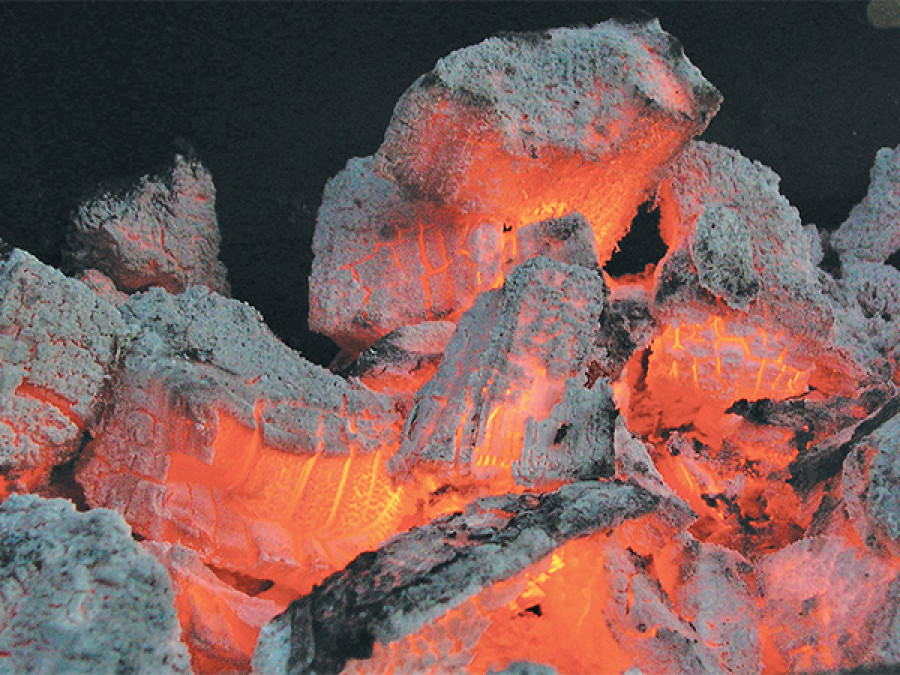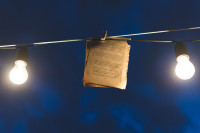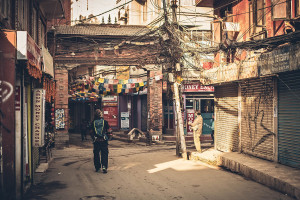Fiction Park
The leftover jalebis
Munna may not even know the difference between a father and a grandfather, for he doesn’t remember his father. Munna was just six months old when his father left
Sudeep Baral
even if you focused all your attention on it, that lonely hut seems like an old stooping man, with a disfigured frame. And as if replicating his house, is Dhanikram, squatting beside ghur, a straw fire.
The fire is long dead but Dhanikram pokes the ashes with his old cane, and the embers, after each poke, glow sharper, radiating faint heat and sprinkling ashes.
“Re Munna,’’ Dhanikram calls out to his five-year-old grandson. “Here, take your potato.’’ Munna doesn’t respond to his grandfather’s call at once. He’s busy covering the buffalo, their only worthy possession, with a pair of jute sacks, cut and tied together in the fashion of a man wearing a waistcoat. When he’s finished with that job, he comes over and stands in front of his grandfather, who prods the ashes and removes a potato from it, and then hands it to his grandson.
Munna settles himself in a pile of straw nearby and rubs the potato in the hem of his loose hanging sweater, to clean off the ash. He uses the same end of his sweater to wipe off his snot when he realises that he smells of buffalo all over.
“It’s still raw,’’ says Munna, spitting out a mouthful of potato that he’d bitten off. ’It’s better that way,” says Dhanikram, without moving his eyes from the heap of ash. ‘’No, you lie. It’ll make my stomach grumble,” retorts Munna. “Now go. Take the milk to Lakhanram. Tell him that this bitch of a buffalo hid its milk today. We’ll compensate for it tomorrow,” Dhanikram directs his grandson, indifferent to the little boy’s complaint.
Going to Lakhanram’s tea shop to deliver milk is Munna’s favourite part of the day. Carrying the milk in a little steel can with its handle sliding through his wrists, Munna strides along, with the thoughts of leftover jalebis and samosas from the day before, which Lakhanram usually hands out to Munna when comes to deliver milk. Munna knows every inch of the lane by heart, so even in that thick cloak of fog, he has no problem walking quickly.
Dhanikram—who remains in the same posture as when Munna left for Lakhanram’s, except that he has discovered and is now poking with his fingers at a small hole in his chadar—is taken by surprise by the thud of the empty can that Munna flings on the ground before him.
“He got mad. And he didn’t even give me any jalebis, that son of a bitch Lakhan,’’ Munna yells. He’s picked up cuss words from the elders of the village, including his grandfather, whose favourite past time is playing cards with others, swearing at the top of his voice. “He said if we are unable to provide even a drop less than two litres a day, we won’t get any payment. How could that idiot say something like that?” Munna finishes the sentence in one breath, his forehead knotted in anger.
“Hush up you little rascal. That little mouth of yours—how dirty is it? It’s reasonable for Lakhanram to get angry. He has customers to serve tea throughout the day and how could he do business if he’s short of milk?” Dhanikram tries to soothe his grandson. “I’ll go and talk with him later.”
Both grow silent. Dhanikram occupies himself with prodding the ash heap. Munna sits with folded knees, leaning on his left hand and doodling on the mud with his right. With an urge to retaliate, venomous words surging up to his throat, but somehow unable to mouth them, Munna sits paralysed with anger, as much toward his own grandfather as toward Lakhanram .
Munna, rolling his eyes without moving his head, involuntarily scans his grandfather’s figure. Dhanikram has a thin, stain-patched chadar wrapped around him, from head toe. He is sitting on his boney bottom, and the top of his bent wobbly knees almost hide his head behind them. Although he still has every tooth still intact, his cheeks are sunken deep, wrinkled in deep folds, like freshly kneaded dough. Munna sees, through the opening of the chadar’s tucked ends, and inside the loose underwear, which is too big for his thin wrinkled thighs, his grandfather’s manhood, wrinkled and hidden in the bush. Munna, seeing this profane thing, is amused and ashamed at the same time; he almost smiles and looks away.
When the frosty wind starts to blow harder, they move inside the hut. At one corner is the kitchen, with a fireplace and a few utensils, and near it is a broad straw mat and two dark, dusty blankets, rolled up and placed carefully against the mud walls. A few nails pinned here and there on the wall; on the nails, which have left little chunks of wall falling off, showing the bamboo bars inside, hang sparse belongings, mostly small bundles tied in white dhoti. Just at the right side of the door when you enter is a pile of sundried dung cakes, guithas, for the fire.
The old man starts to fire the mud stove; he feeds the stove a guitha, breaking it into two, along with a few pieces of wood, which despite having been kept inside the hut, are wet from the dew; he pours a couple of drops of kerosene and lights the stove with his bidi lighter. Munna, devoid of lakhanram’s jalebis today and therefore hungry, silently chops an onion.
After a few minutes of poking around the guithas, and cursing, a bitter smoke wafts out, and the fire eventually lights. Dhanikram smashes the rice pile left from the night before—hard as a rock and cold as ice—into small bits and puts them on the pan with hot oil and four long, pointed chilies already fried and floating in it. Despite their differences in most of things, both grandfather and grandson love hot chilies.
Munna may not even know the difference between a father and a grandfather, for he doesn’t remember his father. Munna was just six months old when his father left, across the border to India, to find a job and earn money; because his father was tired of ploughing the field for others to manage a square meal for his family. Nothing is known of him anymore. Six months later, Munna’s mother eloped, propelled by the intuition that her husband was lying dead somewhere in India and was never going to return to her. She was also swept away by the shirt and trousers (and also sunglasses) of a tractor driver, and by his stories about cities; the driver had come to work in the nearby village from somewhere unknown, and she ran away with him. She had pleaded with her lover to let her take her little son along with them but he hadn’t budged. Either me or that coward’s son, he had said. So one balmy night, she had vainished, leaving her son (she imagined) in the care of lord Ganesh, in whose name she used to fast every Tuesday.
Dhanikram, who knew about his daughter-in-law’s illicit affair was not surprised when she left. He never tried to confront his daughter-in-law for taking a lover in his son’s absence—because just as his body’s frame was, so was he inside—all wooden; he can’t betray his emotions. It almost seems he has not had any. The last time he had felt any emotion—it was pain—was 25 years ago, when his wife died of snake bite. Even when his son prepared to go to India, he hadn’t said a word to stop him. That morning, when he found himself all alone with a toddler to care for, he didn’t complain. To him, that day was the same as any other, except that now he had to remember the old, forgotten skills of rearing up a child.
By the time they finish eating, a faint beam of sunlight appears, parting the gloomy sky. Munna, unwilling to let this opportunity go (they’d had sunshine finally, after a week) hops on the back of the buffalo, to take it to graze.
Dhanikram comes along, reaches for the pointed knee of his grandson, who’s astride the buffalo now and says, “Today when you return, I’ll buy fresh jalebis for you.” Munna sees the misty eyes of his grandfather and looks away. He smiles.




 16.12°C Kathmandu
16.12°C Kathmandu











